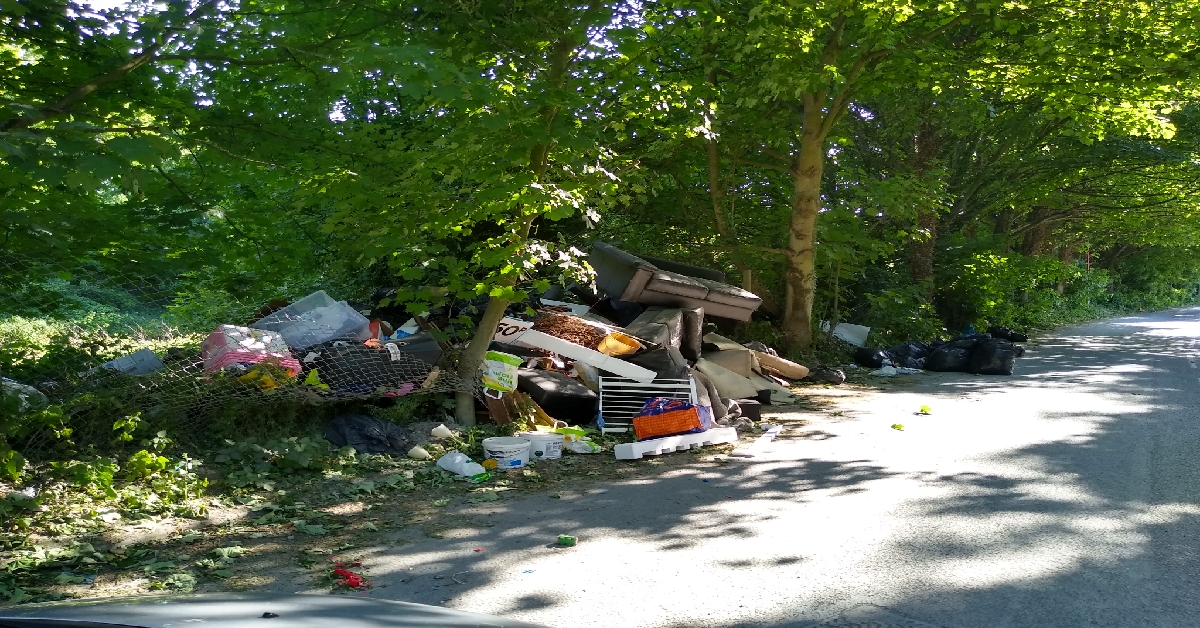Widespread illegal dumping during lockdown prompts outrage among communities
The pile of abandoned tyres looms higher than a house and blocks the full width of the road in an industrial estate in Drumchapel, west of Glasgow city centre. Spiked with other incongruous debris, including children’s toys and a Zimmer frame, this week the city council began the task of proper disposal, an operation expected to cost thousands of pounds.
“I’ve never seen outrage like it,” said local Scottish Labour councillor Paul Carey, in regards to the community response to this “industrial scale” fly-tipping. “Locals are really concerned about the environmental impact as well as the immediate hazard. It’s in the middle of a residential area and if it went on fire you’d have toxic fumes right across their homes,” he said.
But although he described this particular case as extraordinary, he mentioned several other sites in his ward where similar waste piles are building up. “I suspect unscrupulous individuals have seen lockdown as an opportunity to make some money, and perhaps told businesses that they can dispose of waste in a legitimate way but then dumped it,” Carey said.
Across the UK, reports of fly-tipping have soared since lockdown amid the closure of many local authority dumps and other waste management services.
ClearWaste, a free, UK-wide app that forwards independent reports of fly-tipping to local councils, experienced a huge spike in April. It came amid suggestions people were stuck for places to dispose of the extra waste created by lockdown DIY projects in particular. But, significantly, the app has logged a 74% increase in activity so far for July, nearly two months after most recycling centres and dumps reopened.
ClearWaste founder and campaigner Martin Montague, who is based in Hampshire, was prompted to set up the monitoring app after he was himself a victim of fly-tipping. After analysing up to 3,000 reports from around the UK in the past month alone, he said the reasons why incidences have continued were threefold.
“Waste facilities are open, but at significantly reduced capacity, some are booked up weeks in advance and many no longer take building waste,” he said. “Elsewhere, local authorities with stretched resources are struggling to remove waste, so it’s building up and people think they might as well add to it.” He mentioned hotspots, including an abandoned dual carriageway near Newport, Gwent.
Montague added that the public may have turned to unlicensed waste contractors during lockdown and organised criminal gangs had moved into this territory, attracted by the relatively low penalties.
“This is definitely a country-wide problem,” said Phil Jarvis, an arable farmer in Leicestershire. “It has always gone on, whether it’s litter out the car window or tradespeople with nowhere to dump their building waste, but what we are seeing now is an increased frequency and the amounts getting bigger.”
As chair of the environment forum for the National Farmers Union, Jarvis has dealt with cases in Oxfordshire, Lincolnshire and London in the past few weeks alone. These have involved articulated lorries tipping semi-processed waste on to farmland, causing serious problems for wildlife and water courses. The farmers are then left to pay cleanup costs because the dump is on private land.
Beyond this large-scale tipping Jarvis is worried the public may have got into bad habits during lockdown that they are finding hard to break. It is a concern shared by the National Trust, whose rangers are spending 20% of their time clearing up visitors’ debris.
Ben McCarthy, head of nature conservation and restoration at the trust, describes it as “fly-camping”. He said: “They are leaving not only vast quantities of litter behind, but in some instances tents and much of their equipment. We are seeing a disposable festival mentality which we’ve not experienced before.”
The trust was incredulous at the sheer amount of waste people felt was acceptable to dump in the countryside, rather than taking it home with them. It questioned whether increased hygiene anxieties have somehow made it more acceptable.
Those caught fly-tipping risk a fine of up to £40,000. Anyone being offered cut-price waste clearance services “that if a deal sounds too good to be true, it probably is and could lead to a fine if your waste is then subsequently illegally dumped”, said the Scottish Environmental Protection Agency.
Others argue enforcement is far too weak. Montague is working on a trusted trader scheme for waste removal, but data gathered under freedom of information legislation by ClearWaste for the last available year found 18.1% of councils across the UK issued no fines for fly-tipping. “It’s totally shocking that so much is being spent on cleaning up yet so little is being done to deter people in the first place,” he said.
His FoI data tallies with some recently released by the Liberal Democrats which found only 3.6% of complaints about fly-tipping or pollution to England’s Environment Agency hotline resulted in any sanction.
The Local Government Association wants tougher sentences to act as a stronger deterrent. Their environmental spokesperson, Cllr David Renard, says: “We want to work with the government on reviewing sentencing guidelines for fly-tipping, so offenders are given bigger fines for more serious offences, and ensure councils have the funding needed to investigate incidents.”
Many farmers feel helpless, Jarvis said. He called for heavier fines for offenders. But he also believed there should be realism around recycling. “If we’re encouraging people to be greener, then we’ve got to get the recycling route right. We need redesign packaging, have less of it, make it more reusable. If you only make it more difficult to get rid of waste, with landfill taxes, charges at tips, and permits, then fly-tipping is the end point,” he said.
guardian.co.uk © Guardian News & Media Limited 2010
Published via the Guardian News Feed plugin for WordPress.
